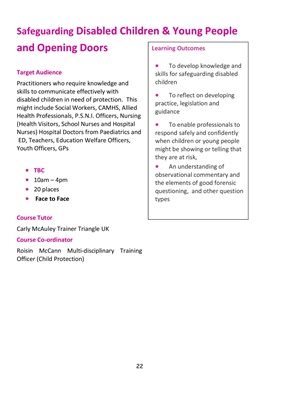
22
Safeguarding Disabled Children & Young People
and Opening Doors
Target Audience
Practitioners who require knowledge and
skills to communicate effectively with
disabled children in need of protection. This
might include Social Workers, CAMHS, Allied
Health Professionals, P.S.N.I. Officers, Nursing
(Health Visitors, School Nurses and Hospital
Nurses) Hospital Doctors from Paediatrics and
ED, Teachers, Education Welfare Officers,
Youth Officers, GPs
• TBC
• 10am - 4pm
• 20 places
• Face to Face
Course Tutor
Carly McAuley Trainer Triangle UK
Course Co-ordinator
Roisin McCann Multi-disciplinary Training
Officer (Child Protection)
Learning Outcomes
• To develop knowledge and
skills for safeguarding disabled
children
• To reflect on developing
practice, legislation and
guidance
• To enable professionals to
respond safely and confidently
when children or young people
might be showing or telling that
they are at risk,
• An understanding of
observational commentary and
the elements of good forensic
questioning, and other question
types
• Ways to keep an open
mind when listening to
children, e.g. open-ended
questions and prompts
that safely 'open doors' for
children.
• Approaches to quickly establish
rapport with children and set safe
expectations when exploring
initial concerns, including
strategies for working with
children in the presence of other
adults.
• Knowledge about how trauma,
impairment and disability can
affect a child's vulnerability and
communication.
▪